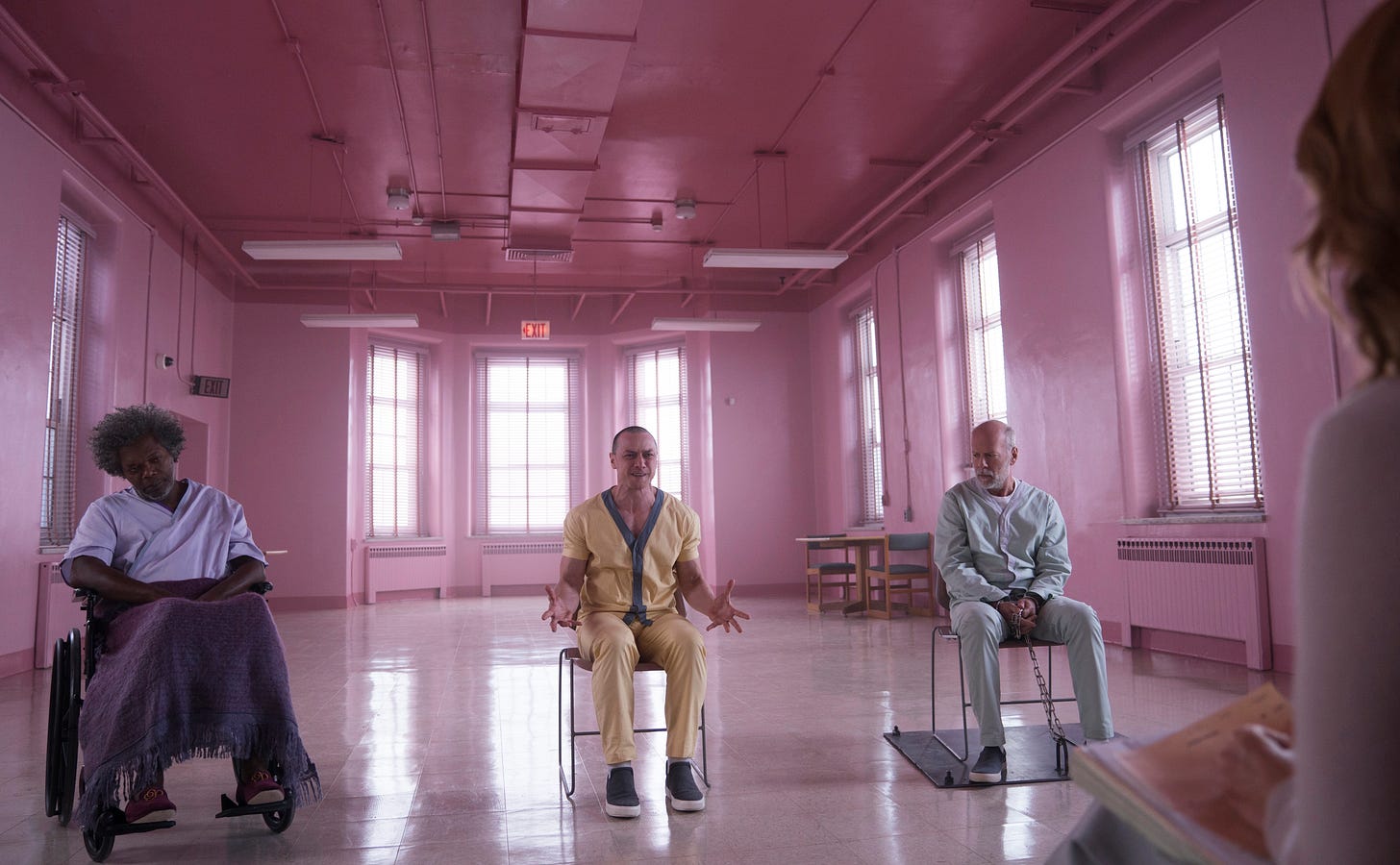
In Fixing Scenes, we look back at films that should have been better and pitch new directions for them abiding by the following rules:
We cannot change anything that came before or after the film if it is part of a franchise
We cannot change real world events that impacted the production of the film
Spoilers for Glass (2019). Trigger warnings for brief mentions of child abuse.
This was a strange one to approach for Fixing Scenes. When I first saw Glass during its theatrical release, I hated it. It had none of the gritty realism of Unbreakable (2000), or the tension of Split (2016), and had an ending that I felt destroyed the characters.
Upon rewatching it for this article, however, my opinion softened. There’s a lot to like about the first two-thirds of Glass. The interactions between the characters are fun, and the performances are excellent. The problems arise in the third act, where writer/director M. Night Shyamalan repeats his most common mistake. He piles twist upon twist, adding unnecessary complications which end up undermining the film.
Still there are the building blocks for a fitting endpoint for the Unbreakable trilogy, and a few tweaks could improve Glass greatly.
What happens…
Following the events of Split, Kevin Wendell Crumb/The Horde (James McAvoy) – a man with 24 distinct personalities, including a superhuman serial killer known as The Beast – is terrorising Philadelphia, attracting the attention of David Dunn/The Overseer (Bruce Willis reprising his role from Unbreakable).
Dunn tracks Crumb to an abandoned factory, where four cheerleaders are being kept hostage. A fight ensues between the two, which is promptly stopped by the police and Dr Ellie Staple (Sarah Paulson), who has them both institutionalised.
At the institution, they find Elijah Price/Mr. Glass (Samuel L. Jackson), who has been kept since Dunn defeated him in Unbreakable. All three are kept separated, in rooms designed to exploit their weaknesses, while Dr Staple interviews them one-by-one, convincing them that they suffer from delusions of grandeur rather than being blessed with superpowers.
While this is going on, Dunn’s son Joseph (Spencer Treat Clark) and Casey Cook (Anya Taylor-Joy), the only person to successfully find a connection with Crumb, independently work to prove Dr Staple wrong.
Price, who has feigned catatonia since his incarceration, manages to escape and convinces Crumb to join him, saying that they can reveal The Beast at the opening of Osaka Tower. He also plans to destroy a chemical lab within the building, continuing his work of revealing new superheroes by manufacturing disasters.
Dunn escapes his room to stop the pair and takes on The Beast outside of the hospital. During this fight, it’s revealed that Crumb’s father was on the same train as Dunn, all the way back at the start of Unbreakable. This means that Price was responsible for Crumb growing up with his abusive mother; abuse that caused his dissociative identity disorder and awoke The Beast.
The Beast kills Price and throws Dunn into a water tank – exploiting his weakness. Cook manages to calm The Beast however and bring the original personality back out, only for Crumb to be shot by a sniper on Dr Staple’s orders. Dunn manages to escape the tank but is drowned in a flooded pothole by Dr Staple’s goons.
In the end, Dr Staple reveals she is part of an organisation that suppresses the existence of superheroes, which in a final twist, is proved to be ineffective when Casey Cook, Joseph Dunn and Price’s mother (Charlayne Woodard) release footage from the final fight online.
What we’d change…
As I said in the introduction, I enjoyed a lot more of Glass on the second viewing. However, there are some clear issues with that final act. Dunn’s death is anti-climactic, and the reveal of Dr Staple’s true role feels rushed. It’s clear that Shyamalan had written himself into a corner and had to throw everything into those last few minutes.
While the scenes in the institution are good, it’s also retreading ground to have Dunn question his abilities. Unbreakable was dedicated to this, so it’s far more interesting to have the various personalities of Crumb forced to question their motives and the validity of The Beast.
So, in that first fight between Dunn and Crumb, I would have Dunn push Crumb through the wall of the factory and down to the police below, but not fall with him. This means Dunn can escape for now, while Crumb is taken away and introduced to Price. By doing this, we can keep the scenes where Crumb’s personalities start to doubt their mission, and we can keep the ingenious way that Price facilitates the escape.
With Dunn’s identity still a secret, we can intercut the scenes in the hospital with him continuing to fight crime. At one point, he bumps into Dr Staple and his ability to see past crimes shows her orchestrating the murders of various people. She notices the strange look on his face and arranges for him to be followed, resulting in Dunn being taken in front of Joseph.
This would drive Joseph into action, just as Cook has also been looking for ways to protect Crumb. Joseph searches out Cook, who discusses Crumb in detail and leads to the discovery that Price killed his father and the two make their way to the hospital.
While this is happening, Dr Staple fast-tracks the three patients for lobotomies, hoping to bring the situation to an end. Like in the film, Price bypasses his procedure by sabotaging the surgical laser, and escapes with Crumb, forcing Dunn to also break out of his room to give chase.
The final confrontation plays out similarly, with Crumb and Dunn throwing each other against vehicles and walls. The pair crash through the water tank together and Crumb holds Dunn under the water while Price looks on, but Joseph stops the fight by revealing what he knows about Crumb’s father.
Crumb goes to attack Price but Cook stands in the way, calming him. Dunn, after getting his breath back, tells both Crumb and Price that Dr Staple has been killing, or otherwise incapacitating superheroes. Dr Staple orders her men to kill the three and they shoot Price before Dunn can stop them, as he wrestles with the armed men, a gun goes off and Cook is shot, prompting Crumb to become The Beast again and kill the attackers.
Just as he is about to kill Dr Staple, Dunn stops him, saying that Cook wouldn’t want him to hurt anyone, but Crumb ignores this and crushes Dr Staple’s spine (as he does with Price in the film). He then runs off towards the Osaka Tower.
Deflated, Dunn listens to Dr Staple’s last words, where she states how dangerous it is for those with superpowers to roam unchecked. Dunn nods – an acknowledgement that superheroes were already keeping the supervillains in check - and starts after Crumb.
Conclusion
I don’t think this is perfect. Glass is a deeply flawed film, and there aren’t many tidy endings you can put on it. However, by allowing Crumb and Dunn to live, you can keep some of the fanservice to comic book lore that Shyamalan awkwardly inserted into his exposition.
This version stops the film from repeating the indecision of Unbreakable, instead focusing more on Crumb and his multiple personalities. It gives McAvoy more time to impress with his incredible characterisations and certainly provides more interesting conflict throughout.
Having Dunn remain outside of the hospital for much of the film also means we can drop hints about Dr Staple’s true intentions, without revealing it all in one go at the finale. It also doesn’t impact the ending. You could argue that Dunn doesn’t even need to be committed, but I think it adds a nice villainous touch to Dr Staple.
Writer/director: M. Night Shyamalan
Starring: James McAvoy, Bruce Willis, Anya Taylor-Joy, Sarah Paulson, Samuel L. Jackson






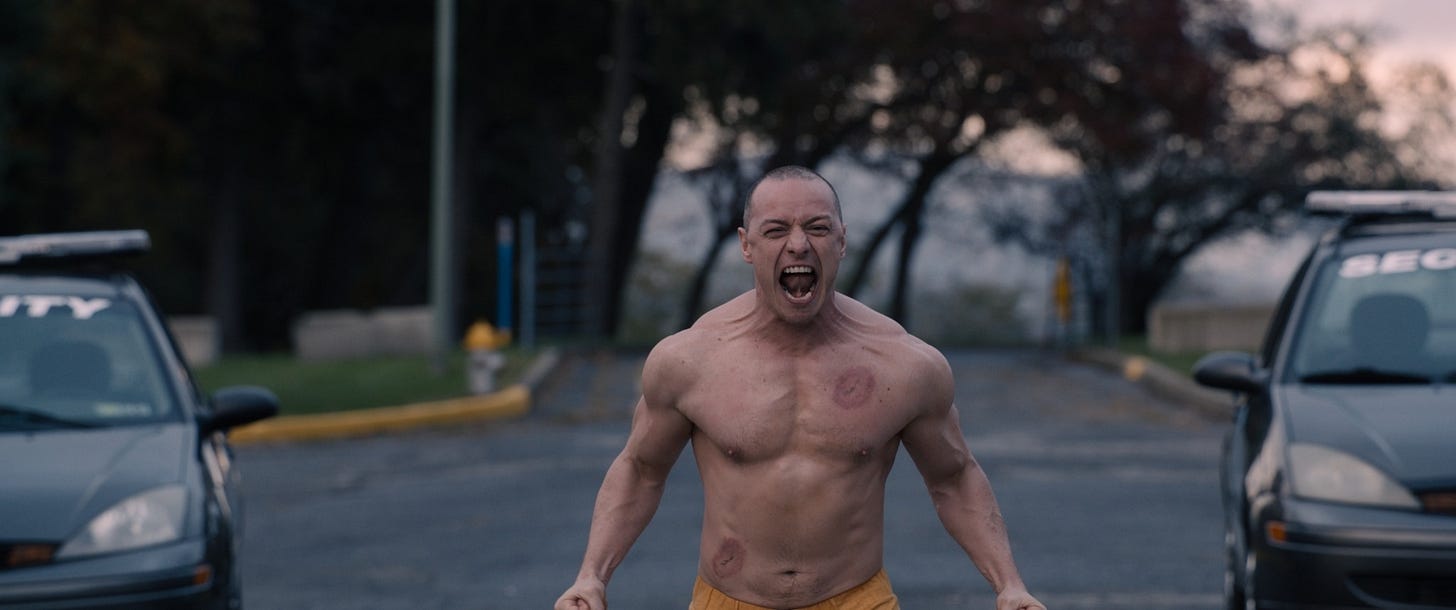
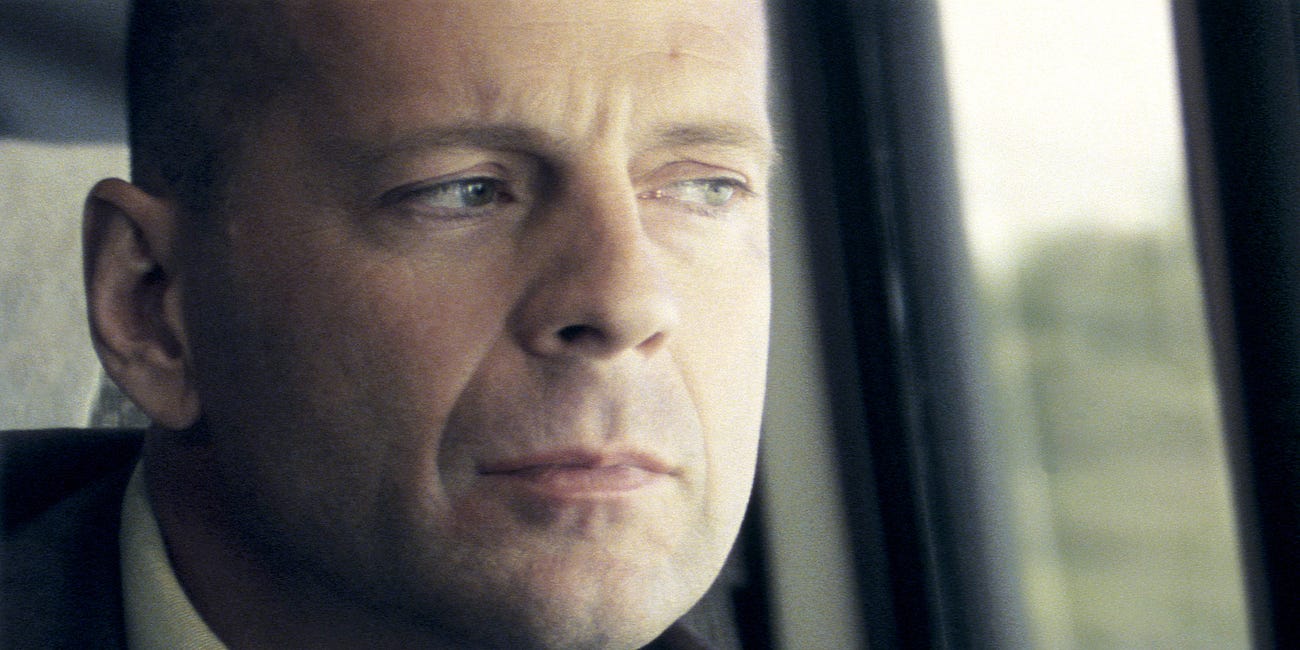
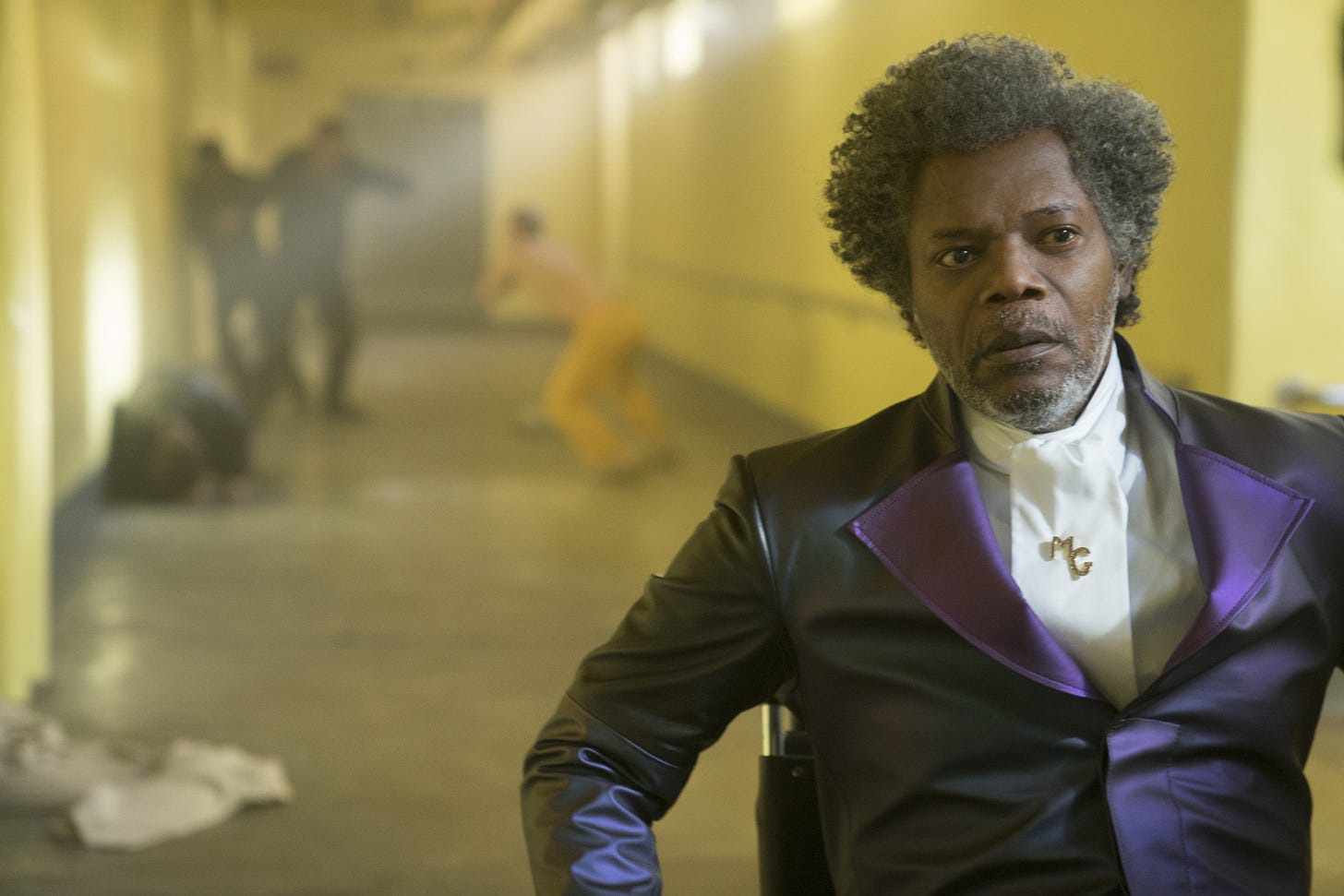
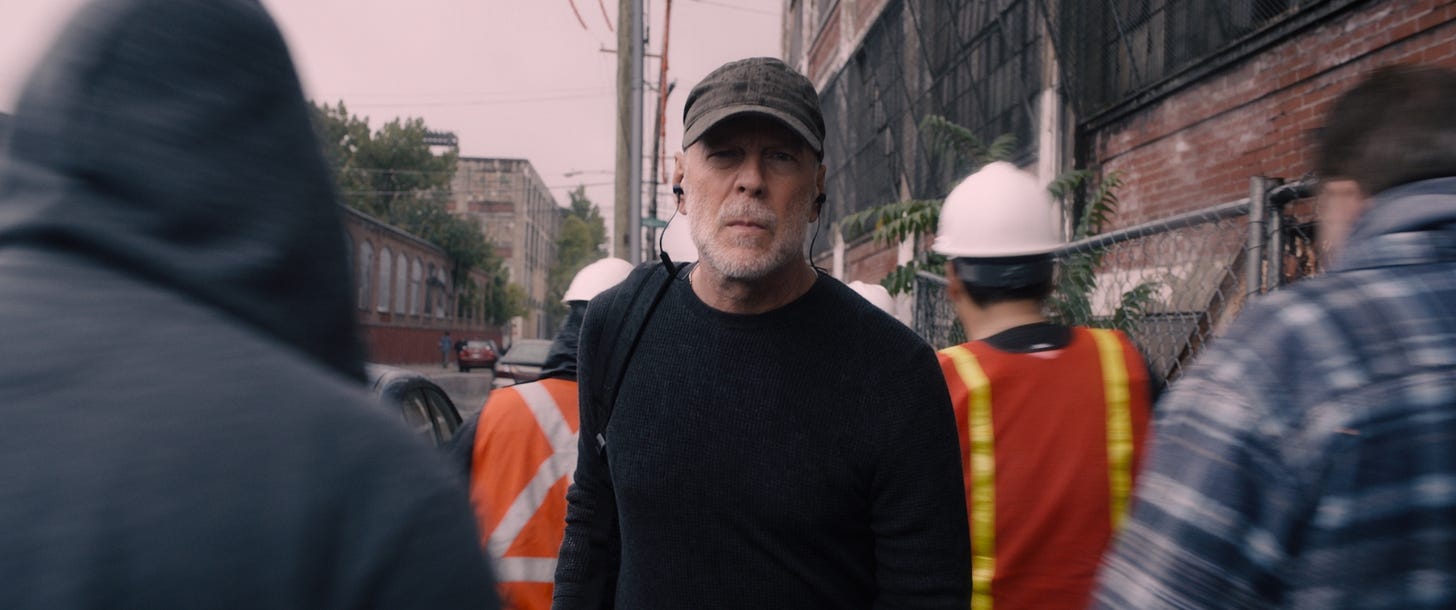
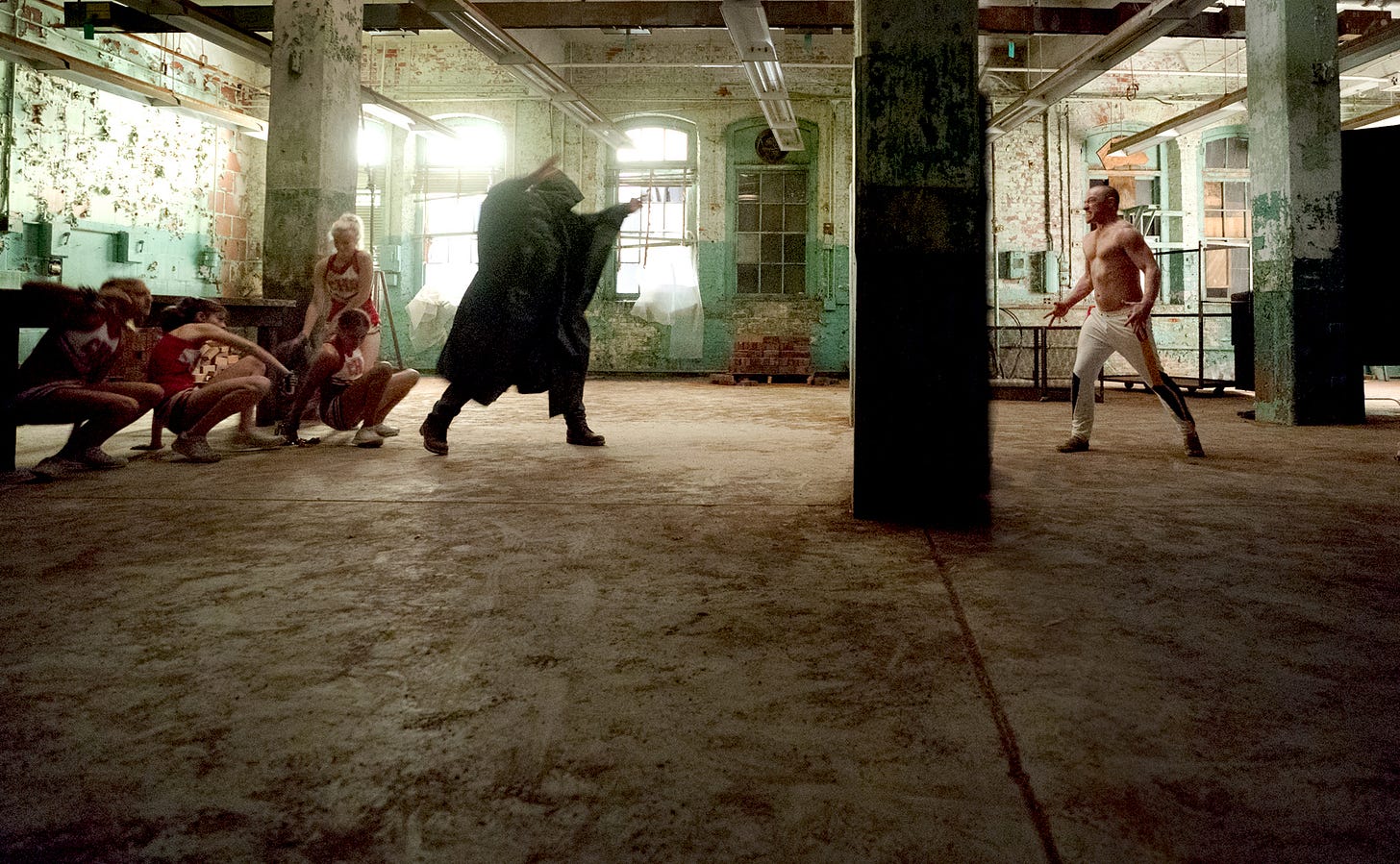

This was a great fix to the ending.
Your fix addresses the broken promise of the film of a final showdown between the Beast and Dunn at Osaka Tower. The current version feels more like a bait and switch than a final showdown. Even with Mr. Glass' genius escape plan, I would have liked to see a direct conflict between Dunn and Mr. Glass. In this conflict, we would see how Mr. Glass' intellect would hold off or stop Dunn's brute force.
If Dunn survived, how would that have changed the world of unbreakable?